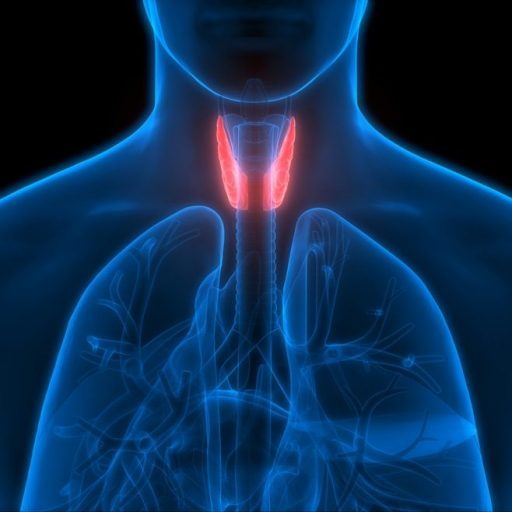Hypothyroidism symptoms in women can be different from those in men, teens, and children. However, the disease itself most often affects middle-aged or older women. This under active thyroid condition occurs when your thyroid gland stops producing enough hormones. Hashimoto thyroiditis is an autoimmune disease that commonly causes hypothyroidism. Radiation therapy can also trigger this condition.
The thyroid is a gland at the base of your neck that is shaped like a butterfly. It produces hormones that control your body’s use of energy. Your metabolism is dependent on having a normally functioning thyroid. Though it is rare, babies may be born with malfunctioning thyroids, or none at all, and young people on occasion will have an under active thyroid. Their symptoms might include poor growth, delayed tooth development, poor mental development, or slow puberty.
Hypothyroidism Symptoms in Women Differ From Symptoms in Men
In men, this disease may cause lethargy, a reduced sexual drive, and depression, as well as weakness in the muscles. It has been known to cause tenderness in a man’s breasts, swelling, and impotence. While it is rare to have thyroid cancer, if a man has tumors in his thyroid, it is usually malignant.
Hypothyroidism symptoms in women are many, though slow to develop. There are reasons why women suffer from this condition far more often than men do. For one thing, the biochemistry of their body is affected by their monthly cycles and accompanying hormonal fluctuations.
 Women are more inclined to diet, and to try extreme methods for dropping pounds, that usually end up in binges, which causes a yo-yo effect. And their cravings for simple carbs … mainly chocolate … provide energy and satisfaction. Unfortunately, this also decreases the metabolic rate. Emotions are also a factor. We women have a tendency to internalize stress, which also triggers the need for more carbs and more sweets. Some researchers believe that the thyroid then makes too much of the hormone.
Women are more inclined to diet, and to try extreme methods for dropping pounds, that usually end up in binges, which causes a yo-yo effect. And their cravings for simple carbs … mainly chocolate … provide energy and satisfaction. Unfortunately, this also decreases the metabolic rate. Emotions are also a factor. We women have a tendency to internalize stress, which also triggers the need for more carbs and more sweets. Some researchers believe that the thyroid then makes too much of the hormone.
Though we rarely suspect hypothyroidism, the symptoms in women are many, in spite of the fact that it may take months, or even years, for them to appear. If it shows up during or after a pregnancy, or when you are in crisis, you might easily mistake it for depression. If the onset is late in life, you might assume you have a condition noted for memory loss and confusion, such as dementia or Alzheimer’s disease.
Hypothyroidism Symptoms in Women Are Tied To Hormone Problems

The severity of your hormone deficiency will determine the number of symptoms you may have over the long run, but the onset will come slowly, with clues that are barely noticeable in the beginning. After all, when you are elderly, it is only natural to blame your age for those feelings of fatigue and sluggishness that you are beginning to experience.
But that is usually just the beginning. As the metabolism continues to slow down, there will be other more obvious changes that you will note. Thyroid symptoms in women may include any or all of the following manifestations. We have already mentioned fatigue and sluggishness which are among the earliest signs:
Hypothyroidism Symptoms in Women Can Include Constipation
Constipation that is long term or very severe may be a sign of this disease. Conversely, irritable bowel syndrome and severe diarrhea may suggest hyperthyroidism.
High cholesterol can be related to hypothyroidism, so have that checked out regularly if you are taking medication for either or both conditions. Dosages might need changing.
Gaining weight is often a sign of a slowed-down metabolism. This is particularly true if you are not eating more than usual and have not changed your workload or exercise program. Of course, if you are suffering from fatigue at the same time, it becomes more difficult to keep up.
Facial Hair, Weight Gain, High Cholesterol and more
- Facial, hair and changes in the skin may occur as hypothyroidism symptoms in women. If you detect hoarseness in your voice, thinning eyebrows, eyelids that are drooping, swelling and puffiness around your face, it is time to see a doctor about the possibility. The skin on your palms may turn faintly orange, and your hair, nails, and skin may get very dry and pale, or even feel hard or brittle to the touch.
- Unexplainable depression that lasts for a long period of time is also a symptom. It can include sadness, loneliness, and not caring about what is going on around you. Fortunately, this feeling usually goes away once you are on medication for the thyroid condition.
- You might be feeling weak and sore muscles that are tender and stiff for no good reason. You think it might be arthritic inflammation, but if other of these symptoms are also occurring, you need to see your physician. Your much needed sleep may be disrupted by this pain.
- Menstrual cycles may be more frequent, heavier, and more painful. Your skin might be cold to the touch, and it might seem difficult to get yourself comfortably warm.
Hypothyroidism Symptoms in Women Can Go Undiagnosed For Years
 When left undiagnosed and untreated, hypothyroidism gradually worsens. This can result in a goiter, a condition where the thyroid gland enlarges so much that it becomes easily felt or seen, affecting both appearance and the ability to swallow and breathe. The disease can also raise cholesterol levels, leading to various heart problems. Myxedema, a rare and life-threatening complication, causes lowered body temperatures, decreased breathing, and low blood pressure.
When left undiagnosed and untreated, hypothyroidism gradually worsens. This can result in a goiter, a condition where the thyroid gland enlarges so much that it becomes easily felt or seen, affecting both appearance and the ability to swallow and breathe. The disease can also raise cholesterol levels, leading to various heart problems. Myxedema, a rare and life-threatening complication, causes lowered body temperatures, decreased breathing, and low blood pressure.
To treat an underactive thyroid, doctors replace the hormone that the thyroid does not produce adequately. This treatment involves a simple, small pill, taken in the smallest effective dosage that normalizes hormone levels and alleviates symptoms. Initially, patients likely need to monitor their thyroid every 2-3 months until doctors can confirm comfortable regulation. Patients should always take their medication, whether they feel better or not.
Sudden Weight Loss, Shakiness & Sweating
However, if you start sweating without reason, get very shaky or begin to lose weight for no reason, tell your doctor immediately. It is probably just a matter of lowering the medication level to get you balanced once more.
The hypothyroidism symptoms in women are many, and slow to manifest themselves. If you ever had thyroid surgery, treatment with radioactive iodine or anti-thyroid medications, or radiation therapy to your head, neck or upper chest, have your thyroid levels check routinely.
Update October 2023
(Source: https://www.ncbi.nlm.nih.gov/pmc/articles/PMC9939761/)
Recent research has shed new light on the complexity of diagnosing and treating hypothyroidism, particularly in women. Key findings from the study include:
- Non-Specific Nature of Symptoms: Common symptoms like fatigue, lethargy, and dry skin are non-specific and cannot solely be used to identify hypothyroidism. This underscores the need for comprehensive diagnostic approaches beyond symptom checking.
- Challenges in Subclinical Hypothyroidism: Many patients with subclinical hypothyroidism do not show symptoms, while others experience them as frequently as those with normal thyroid function. This finding challenges the traditional understanding of symptom presence in thyroid disorders and suggests a need for a more nuanced approach to diagnosis and treatment.
- Importance of Patient-Reported Outcomes (PROs): The study highlights the increasing use of PROs in clinical practice to improve patient care. PROs, like the thyroid-related quality of life patient-reported outcome measure (ThyPRO), are crucial for assessing the impact of thyroid disease on patients’ lives, offering a more patient-centered approach to treatment.
- Reevaluation of Levothyroxine Treatment: Approximately one-third of patients undergoing thyroid hormone discontinuation remain euthyroid, suggesting that some patients might be overtreated. This calls for a more systematic approach to reevaluate the necessity of ongoing treatment in certain cases.
- Biochemical Monitoring Challenges: The study discusses the complexities in biochemical monitoring of thyroid hormone levels, especially in specific situations like pregnancy, aging, and non-thyroidal illness. It emphasizes the need for robust diagnostic criteria and adherence to guidelines.
- Treatment of Subclinical Hypothyroidism: The research suggests focusing on concomitant diseases rather than expecting symptomatic relief from levothyroxine substitution in subclinical hypothyroidism. This is particularly relevant for older adults, where treatment does not significantly improve symptoms or quality of life.
- Persistent Symptoms in Treated Patients: Even with ‘normal’ laboratory outcomes, some patients continue to experience symptoms. The study explores alternative explanations, including the role of autoimmunity and the potential mismatch between plasma thyroid hormone concentrations and tissue-level effects.


